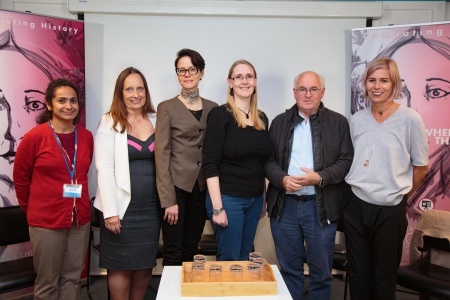Panel Debate Launches Exhibition

In John Naughton's June 2017 column for the Guardian, Want to succeed in tech? Try not to be a woman..., he asks, "What lies behind the abusive or derogatory attitudes to women that one finds both in the (tech) industry and the products (for example, social media) that it has created?" These questions and more were debated at a live panel event on the opening evening of our new women in computing exhibition Computing History: Where Did All the Women Go? The panel was chaired by writer and activist Suw Charman-Anderson, who was joined by Professor John Naughton; businesswomen Claire Hopkins and Dr Valerie Lynch; and Dr Amanda Prorok, lecturer at the Computer Laboratory, University of Cambridge. Panel Suw Charman-Anderson is the founder of Ada Lovelace Day, an international celebration of the achievements of women in science, technology, engineering and maths. Each year, ALD hosts a flagship science cabaret event in London, whilst around the world independent groups put on their own events. Prior to working full-time on Ada Lovelace Day, Suw was a social technologist and, as one of the UK’s social media pioneers, worked with clients worldwide. A freelance journalist, she has written about social media, technology and publishing for The Guardian, CIO Magazine and Forbes. In 2005, Suw co-founded the Open Rights Group, a digital rights campaigning group. Claire Hopkins is Founding Director of Ideal, an IT company which designs, provides and manages secure IT infrastructure. Ranked by Tech Track as one of Britain’s fastest growing private technology companies for the last 2 years, Claire created a company with a culture of excellence, combining customer-focused account management with a highly skilled in-house engineering group. New to IT when she founded Ideal, Claire brought fresh eyes to the industry and has campaigned to encourage more women in IT, tackling everyday sexism in the industry and promoting diversity. Dr Valerie Lynch is CEO and founder of AND Technology Research Ltd, and is an active participant in a number of creative and electronic industry organisations. Her career began as a programmer/analyst for British Telecom and has involved creating digital and electronics based solutions for consumer, industrial and telecommunications products. A believer in life-long learning, Valerie achieved Chartered Director in 2012 and in 2013 was awarded a PhD for her work investigating the value of embedded software. In addition to her role at AND Valerie undertakes research with the Cambridge University’s Institute for Manufacturing. Professor John Naughton is a Senior Research Fellow in the Centre for Research in the Arts, Social Sciences and Humanities (CRASSH) in Cambridge. He is also Emeritus Professor of the Public Understanding of Technology at the Open University, Director of the Press Fellowship Programme at Wolfson College, Cambridge and the Observer's technology columnist. His most recent book -- From Gutenberg to Zuckerberg: what you really need to know about the Internet is published by Quercus. Dr Amanda Prorok is a University Lecturer in Cyber-Physical Systems at the Computer Laboratory, University of Cambridge. Previously, she was a Postdoctoral Researcher in the General Robotics, Automation, Sensing and Perception (GRASP) Laboratory at the University of Pennsylvania, where she worked with Prof. Vijay Kumar on networked robotic systems. She completed her PhD at EPFL, Switzerland, where she addressed the topic of localization with ultra-wideband sensing for robotic networks. Her dissertation was awarded the Asea Brown Boveri (ABB) award for the best thesis at EPFL in the fields of Computer Sciences, Automatics and Telecommunications. Further awards include Finalist for Best Multi-Robot Systems Paper at ICRA 2017, Best Paper at BICT 2015, and MIT Rising Stars 2015. For more information contact: Elaine Symonds - elaine@computinghistory.org.uk
Date : 09-10-2017 |











